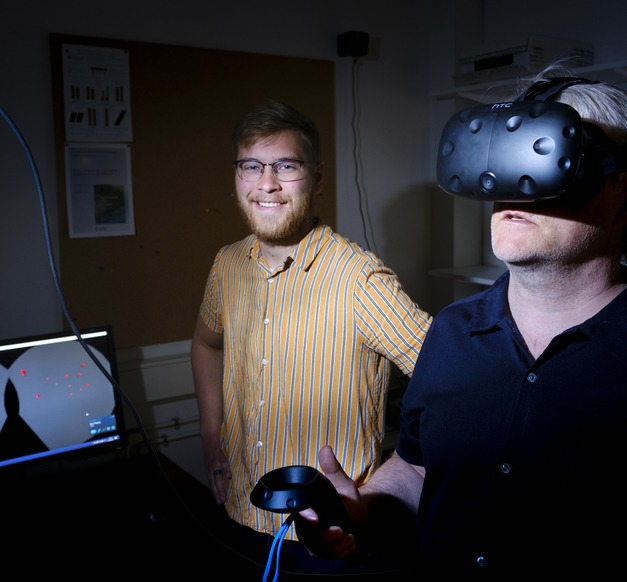
Obsessive-compulsive disorder is a disorder characterised by intrusive thoughts, compulsions or delusions that cause anxiety. The latest research of Ágúst Pálsson, Master's student in clinical psychology at the University of Iceland, is intended to shed new light on attentional function in people with such disorders, which could also lead to opportunities to develop effective treatments.
"The goal is to develop ways to measure attentional function in anxiety disorders such as obsessive-compulsive disorder. We will develop visual foraging tasks, which is one kind of attentional task used in psychological research, using a virtual reality environment where people look for faces with negative expressions among faces with positive expressions. Participants' performance in these tasks will be measured against measurements of their anxiety," says Árni Kristjánsson, professor at the Faculty of Psychology and Ágúst's supervisor.
"Obsessive-compulsive disorder is characterised by recurring and unwelcome intrusive thoughts. These thoughts are the obsessions. They can occur even though the person realises that they are not based in reality. Compulsions are a kind of behaviour related to these obsessive thoughts, intended to prevent the obsessions from coming true. A simple example, and pertinent considering events in recent months, might be obsessive thoughts about infection and constant hand washing. However, concerns about COVID-19 and a lot of hand washing in recent months in general would not be considered an indication of obsessive-compulsive disorder, since there is a rational basis for the worries and the behaviour. It will be interesting, though, to see how people behave once the pandemic is over. Will anybody develop the disorder after the pandemic?" wonders Árni.
The latest research of Ágúst Pálsson, Master's student in clinical psychology at the University of Iceland, is intended to shed new light on attentional function in people with such disorders, which could also lead to opportunities to develop effective treatments.

The research will be conducted using the Samsung Gear 360 camera, which records a 360° environment, making it possible to create different situations in virtual reality for the participants and measure their reactions. The researcher can fully control what people see within the virtual reality environment and is thus able to significantly impact their perceptions and experiences, which is key to reducing fear and anxiety triggered by certain situations or stimuli. Such methods are used to treat obsessive-compulsive disorder and other anxiety-related problems.
"Visual foraging measures attentional function significantly better and in a more variable way than other attentional tasks. We hope therefore to be able to more accurately measure attentional errors and also develop better treatments for people dealing with anxiety disorders," says Árni.
Virtual reality enables researchers to create specific situations and environments which, according to Ágúst, open up opportunities to research precipitating and perpetuating factors in mental disorders, including obsessive-compulsive disorder.
"Using virtual reality, it is easy to create situations which would otherwise be difficult to simulate. This technology is still being developed and perhaps is still in its infancy, but it opens up a lot of possibilities. One benefit of virtual reality is that it gives you the option of varying the difficulty of situations. Often, anxiety and fear are treated by starting with easier tasks and gradually working up to more difficult tasks. The level of control offered by virtual reality should therefore be useful in our research," says Ágúst, who is working on the research project with funding support from the Student Innovation Fund this summer. The goal of the Fund is indeed to give universities, research institutes and companies the opportunity to hire undergraduate and Master's students for summer jobs on ambitious and challenging research projects such as this one.


